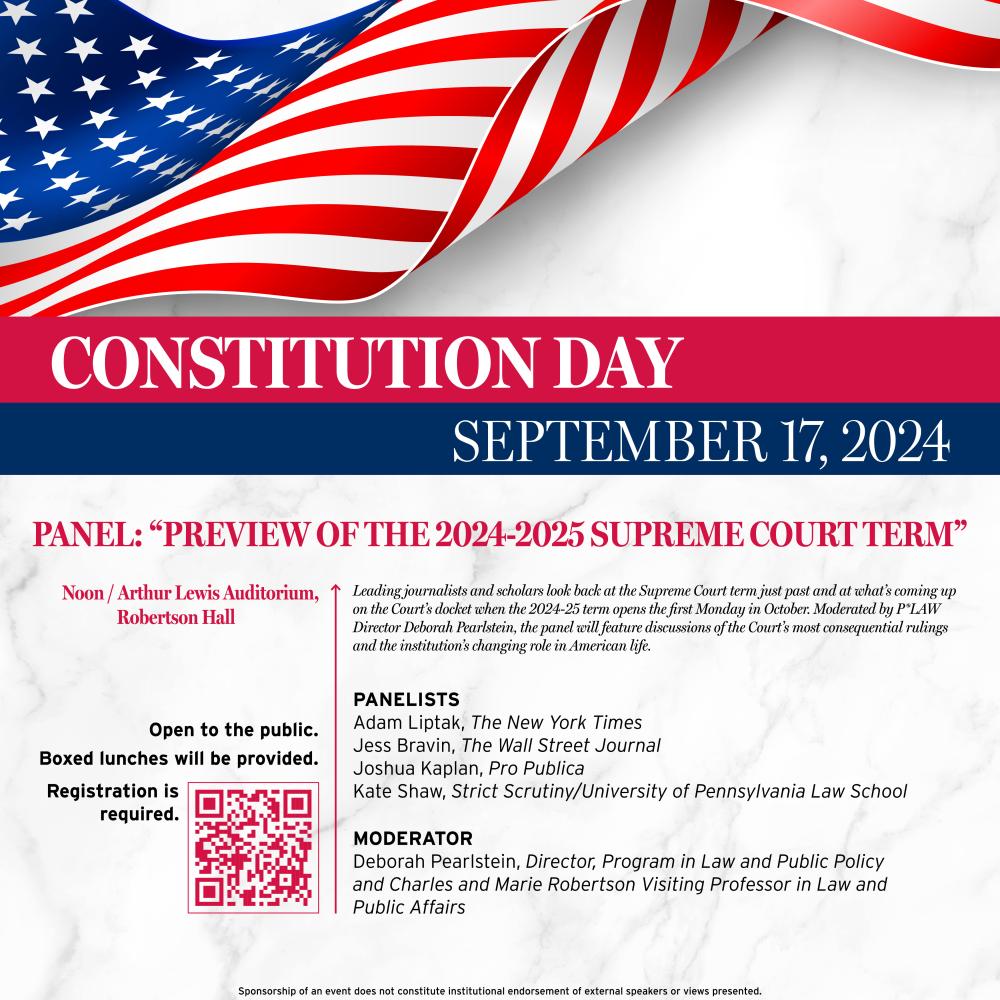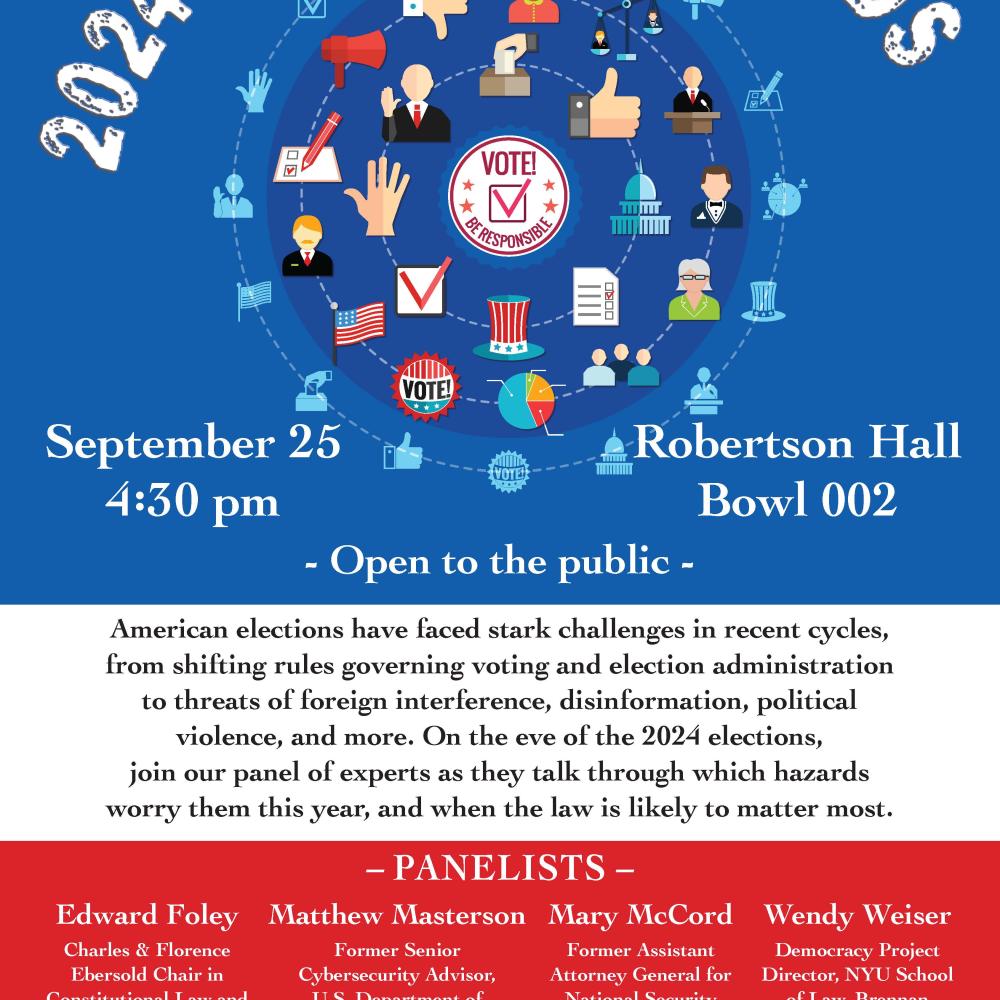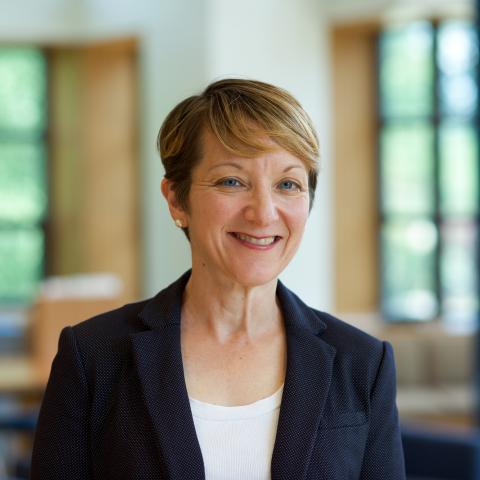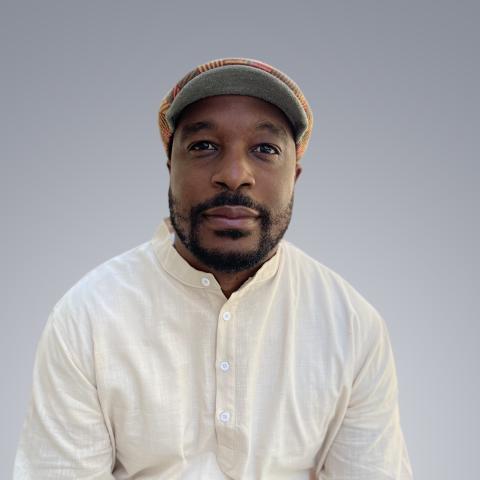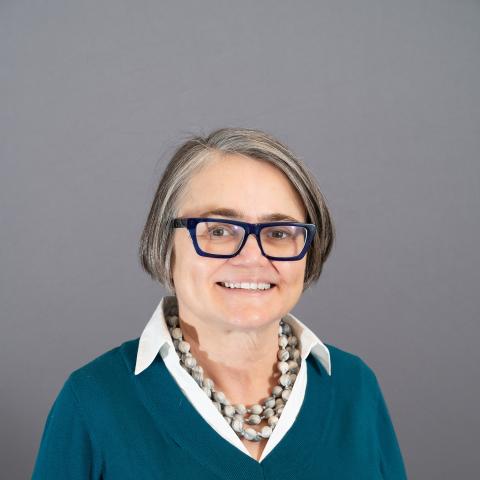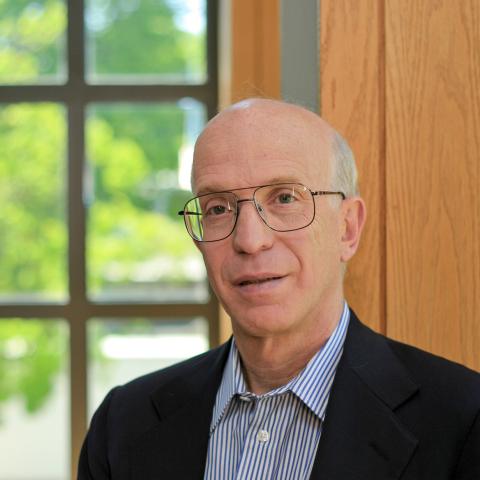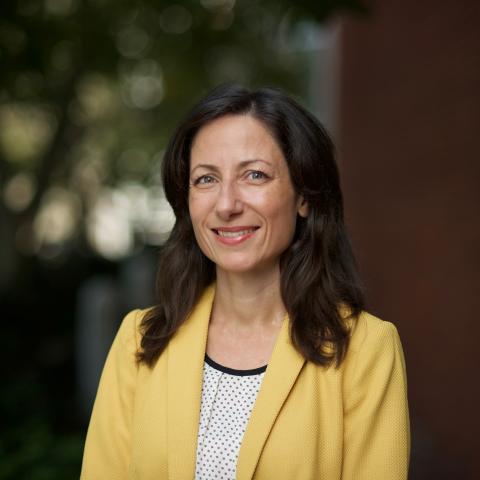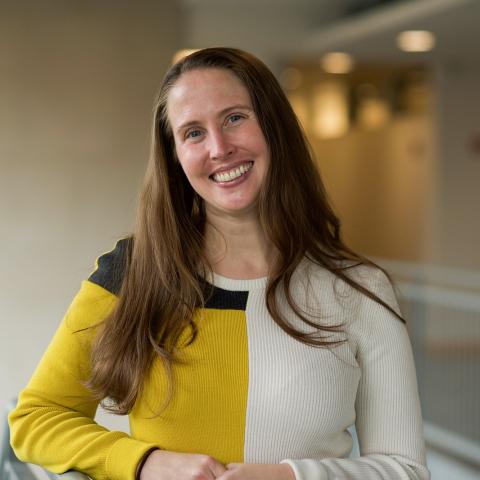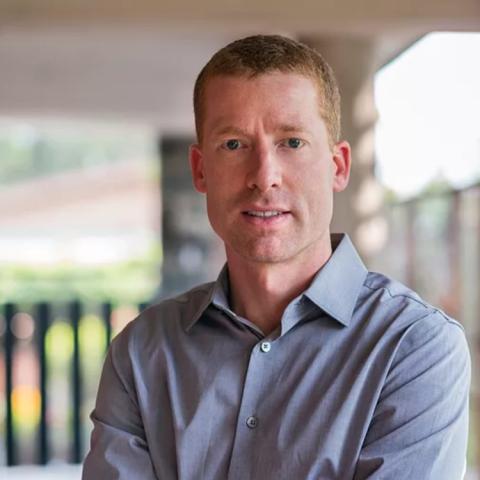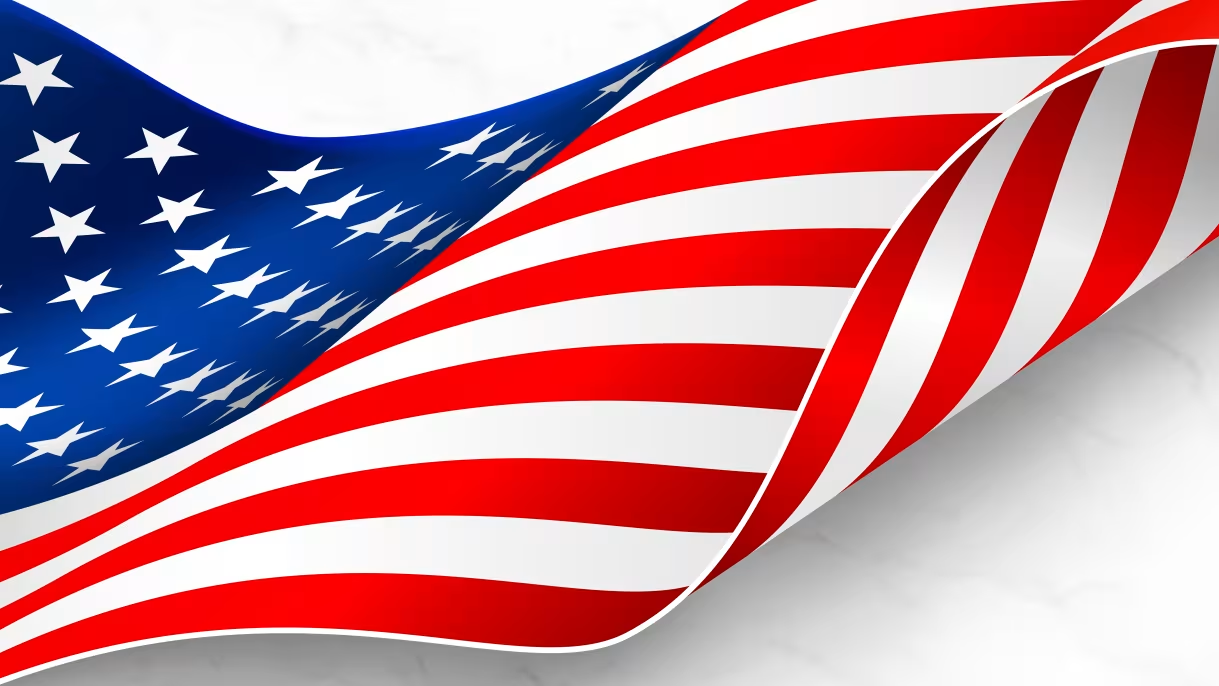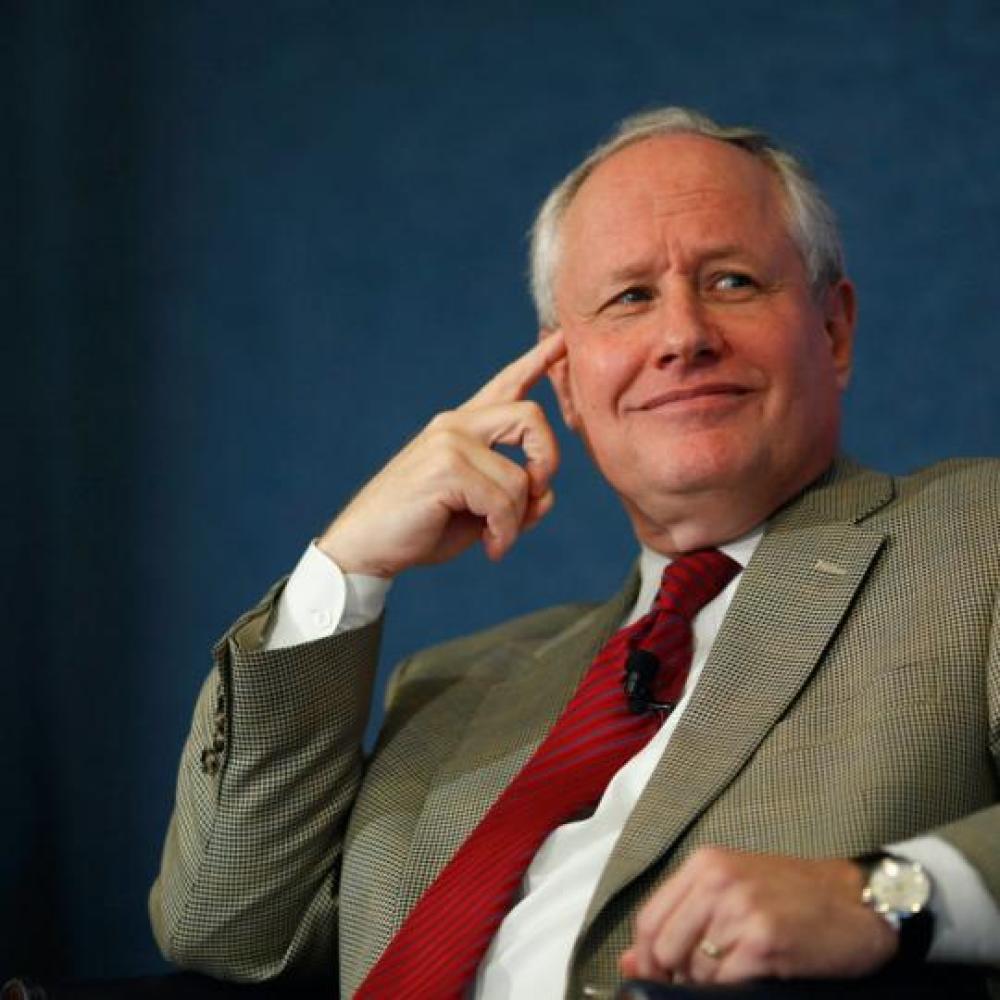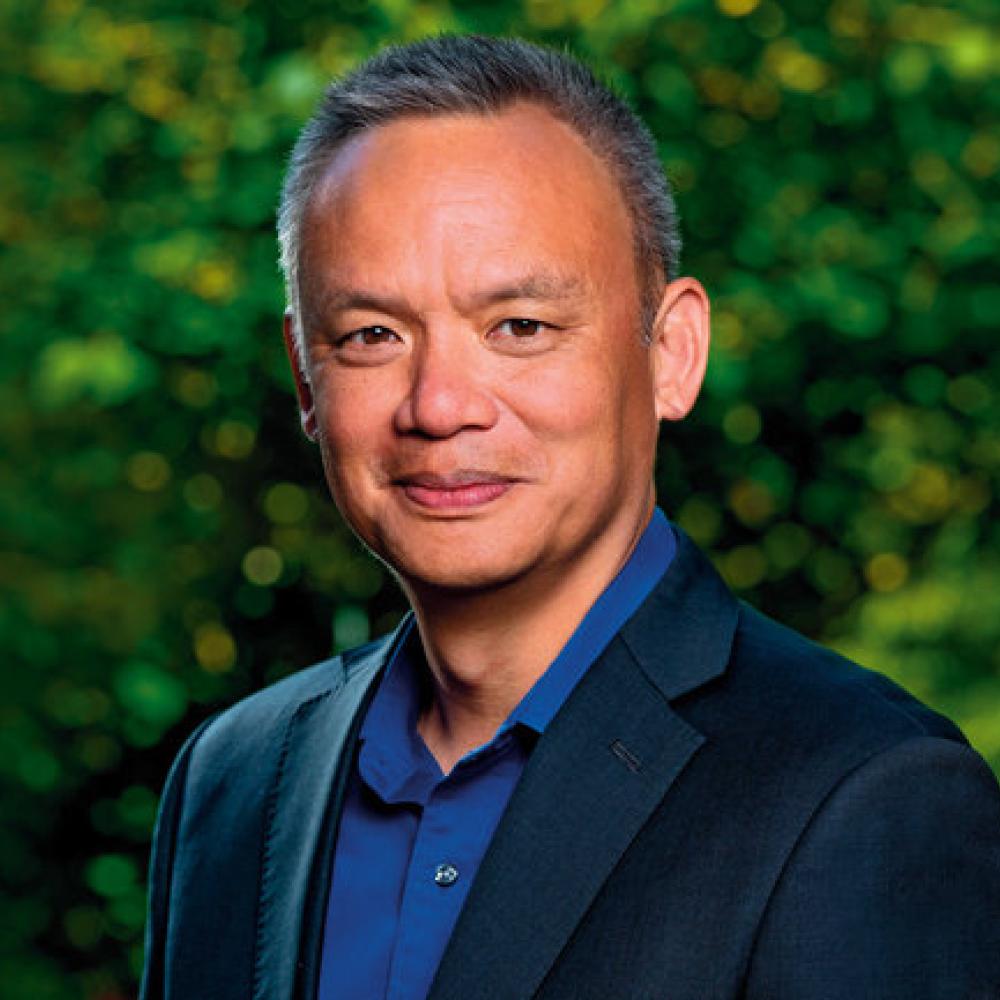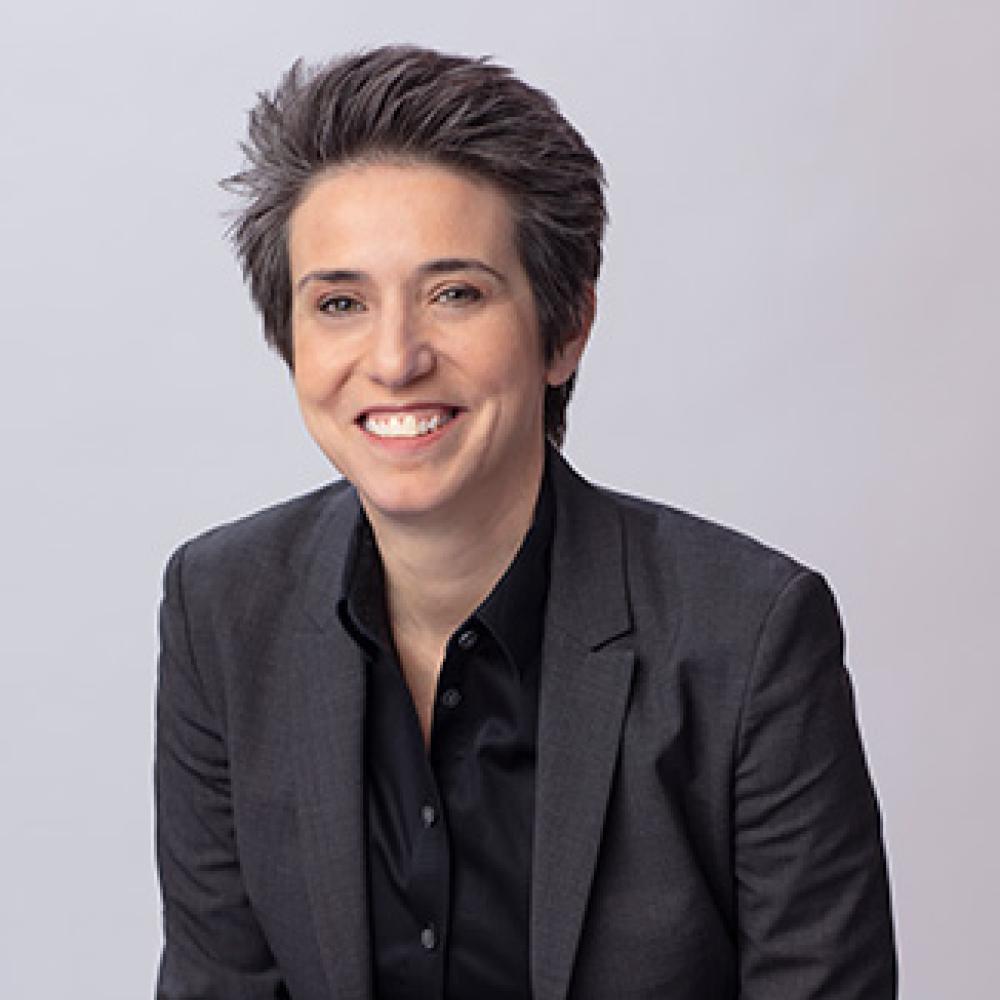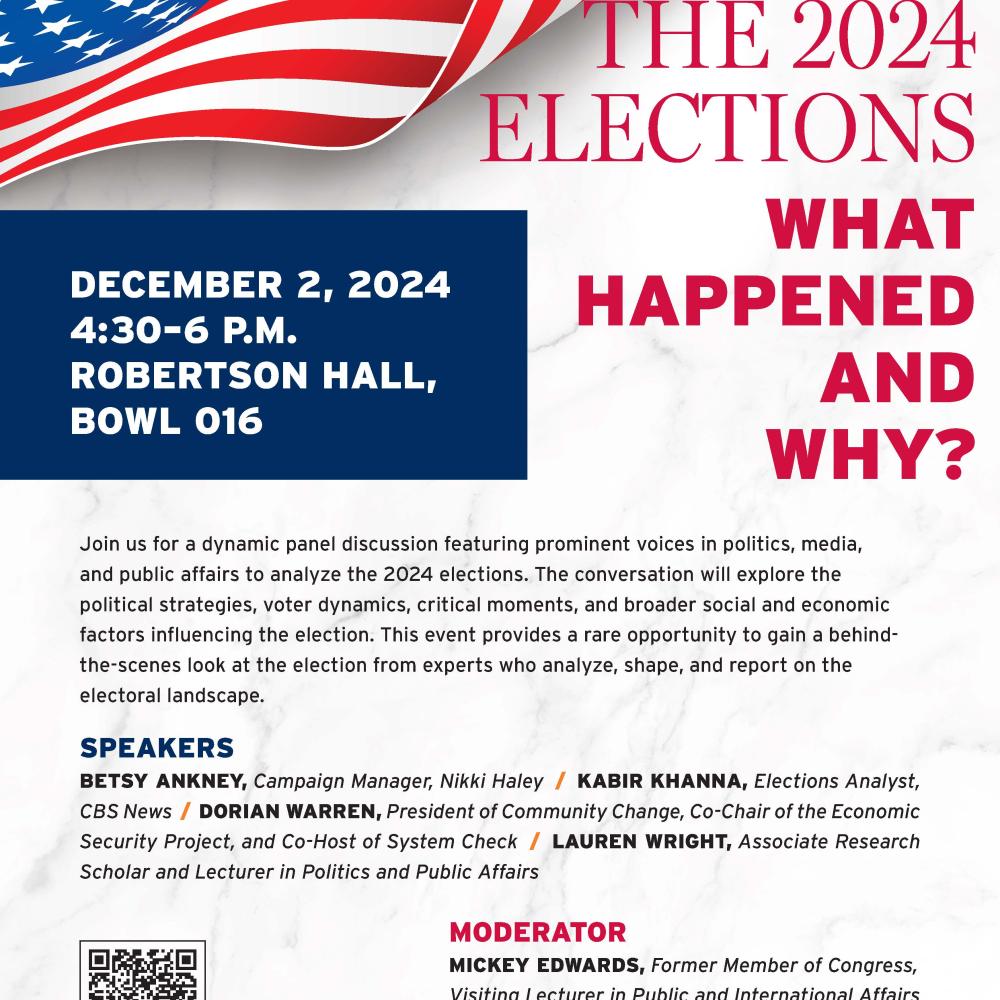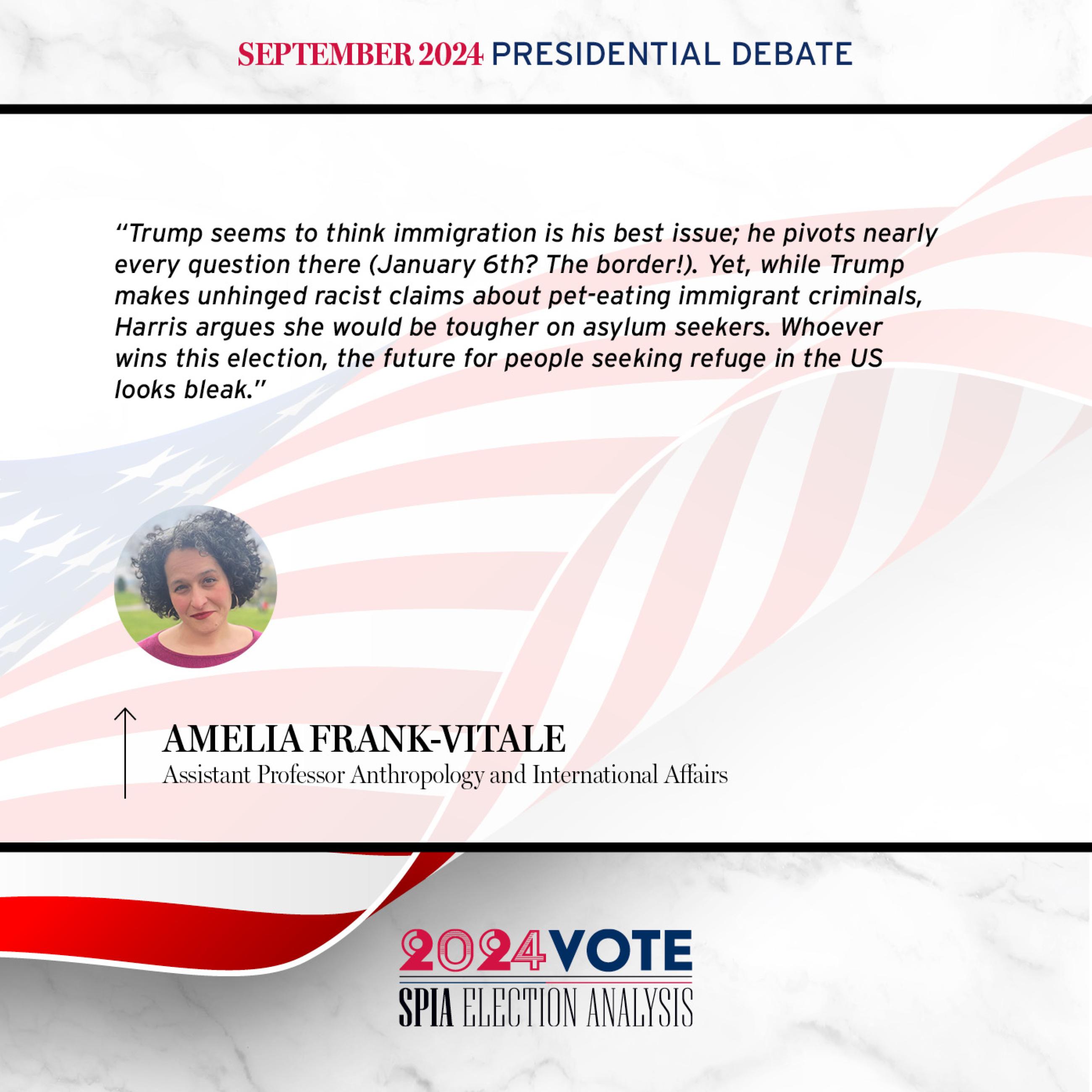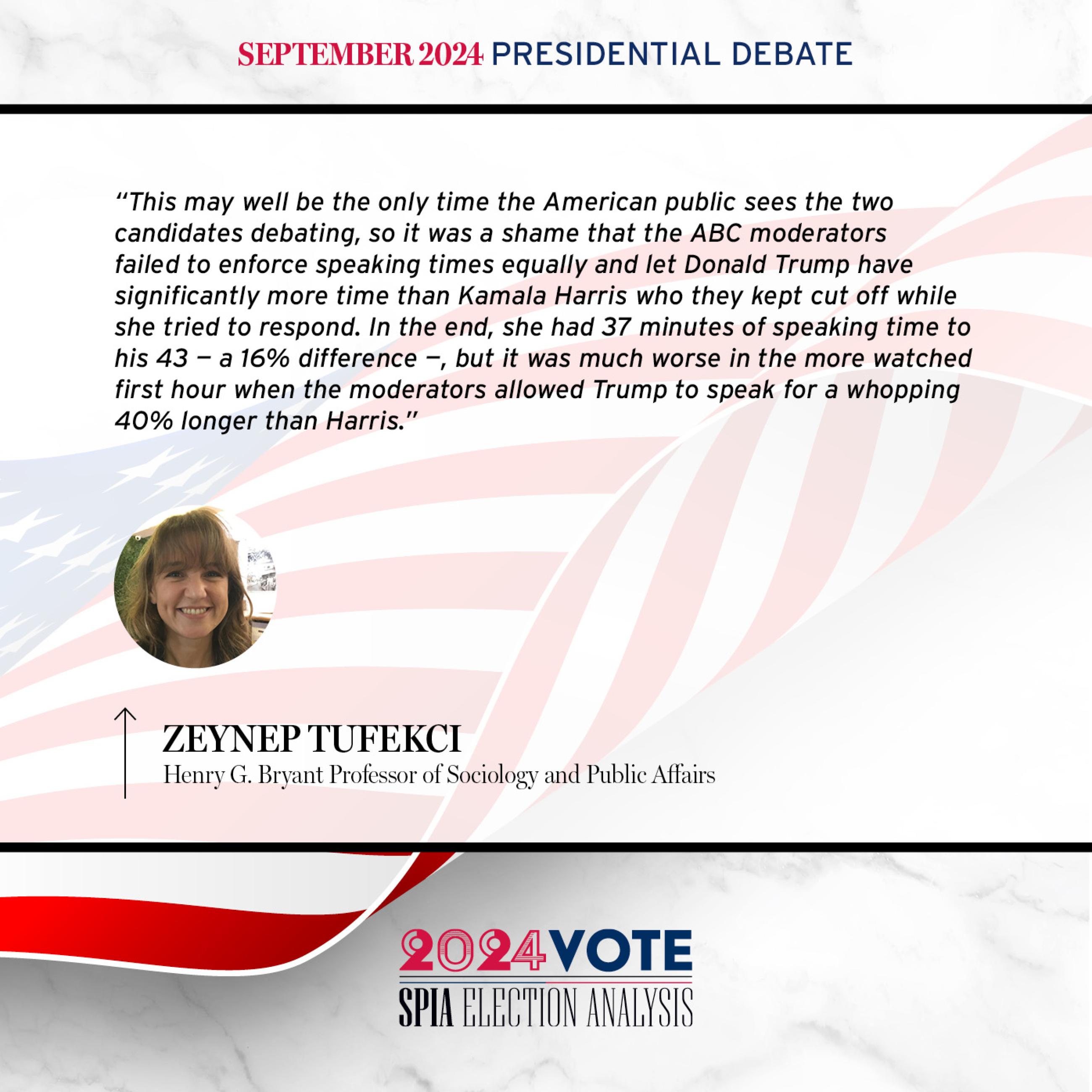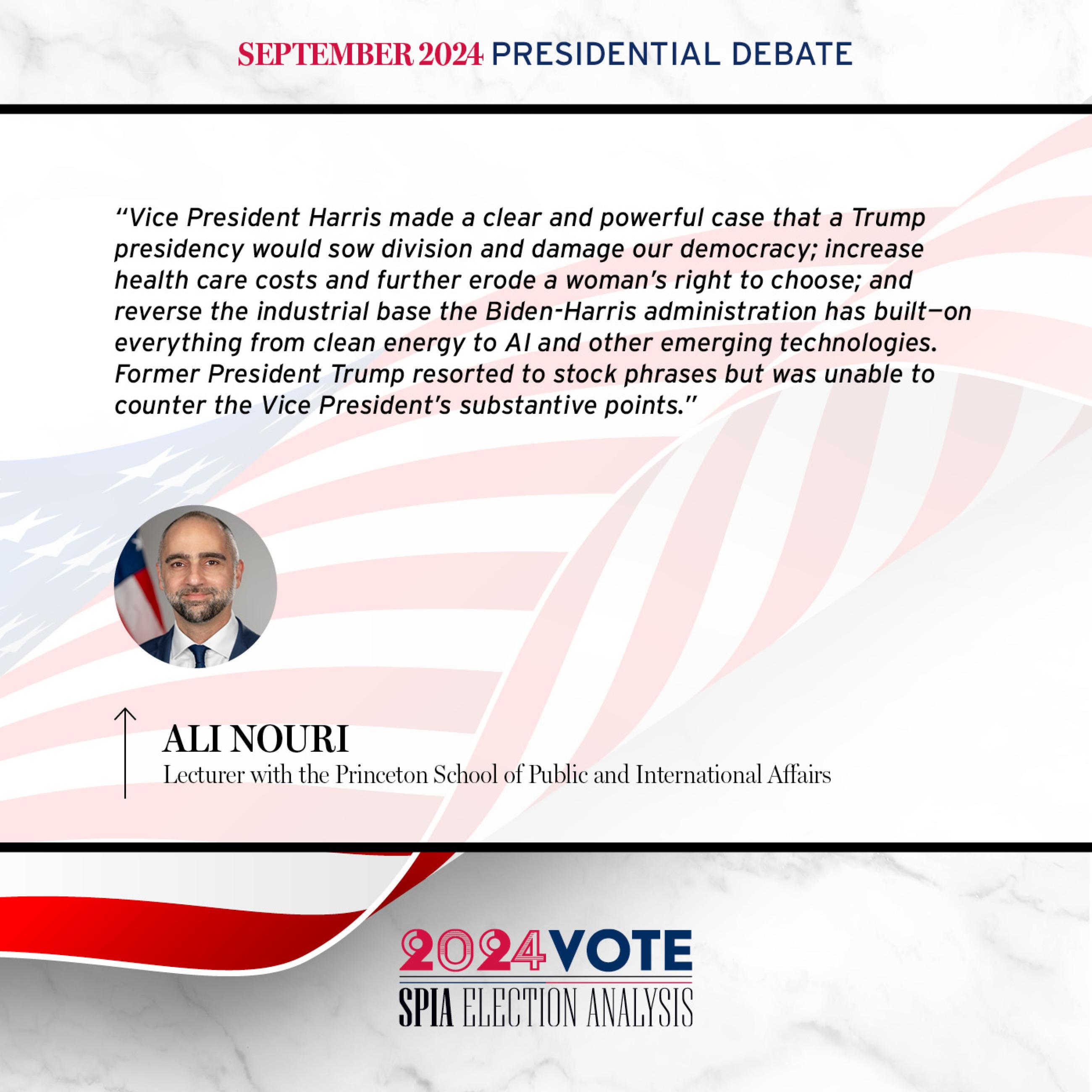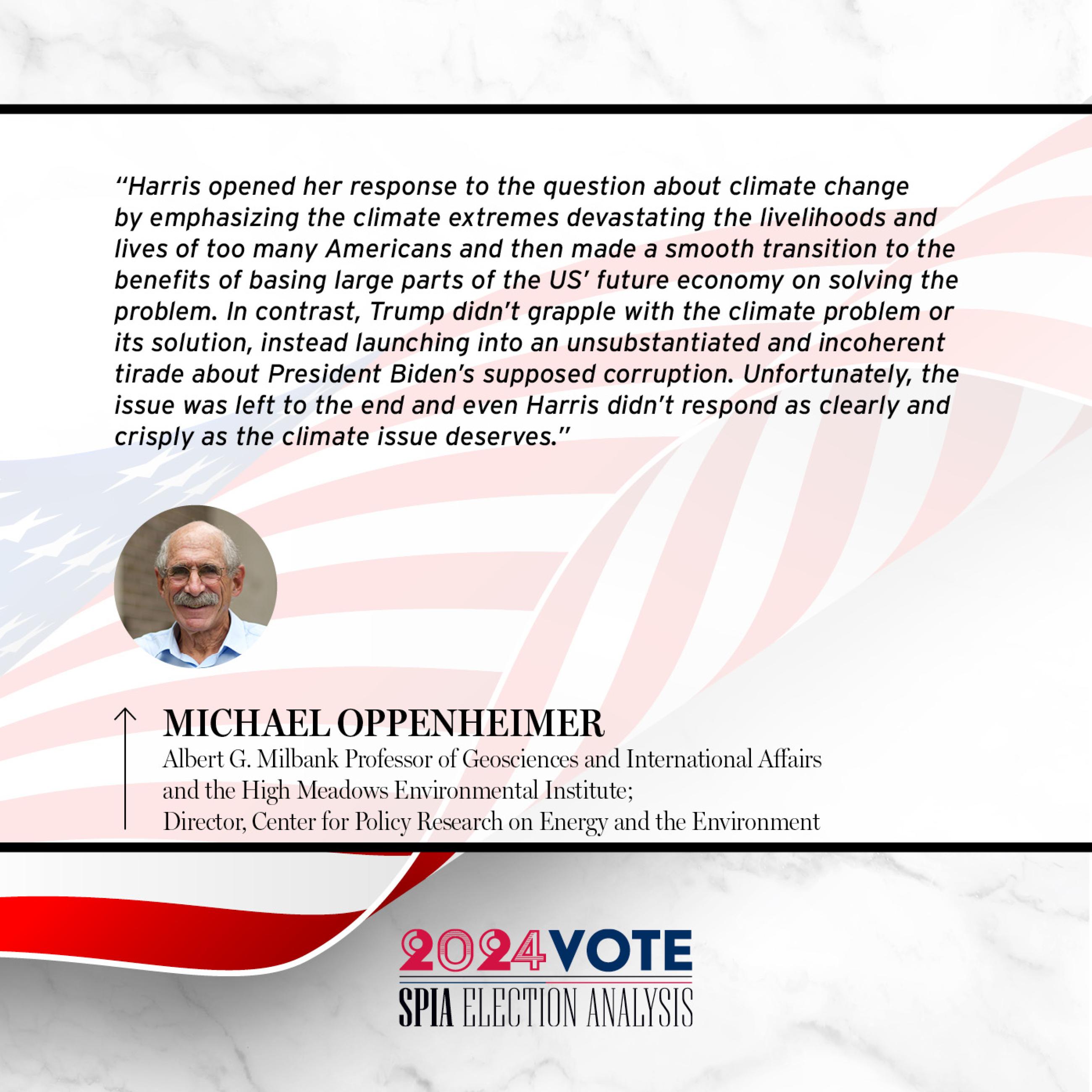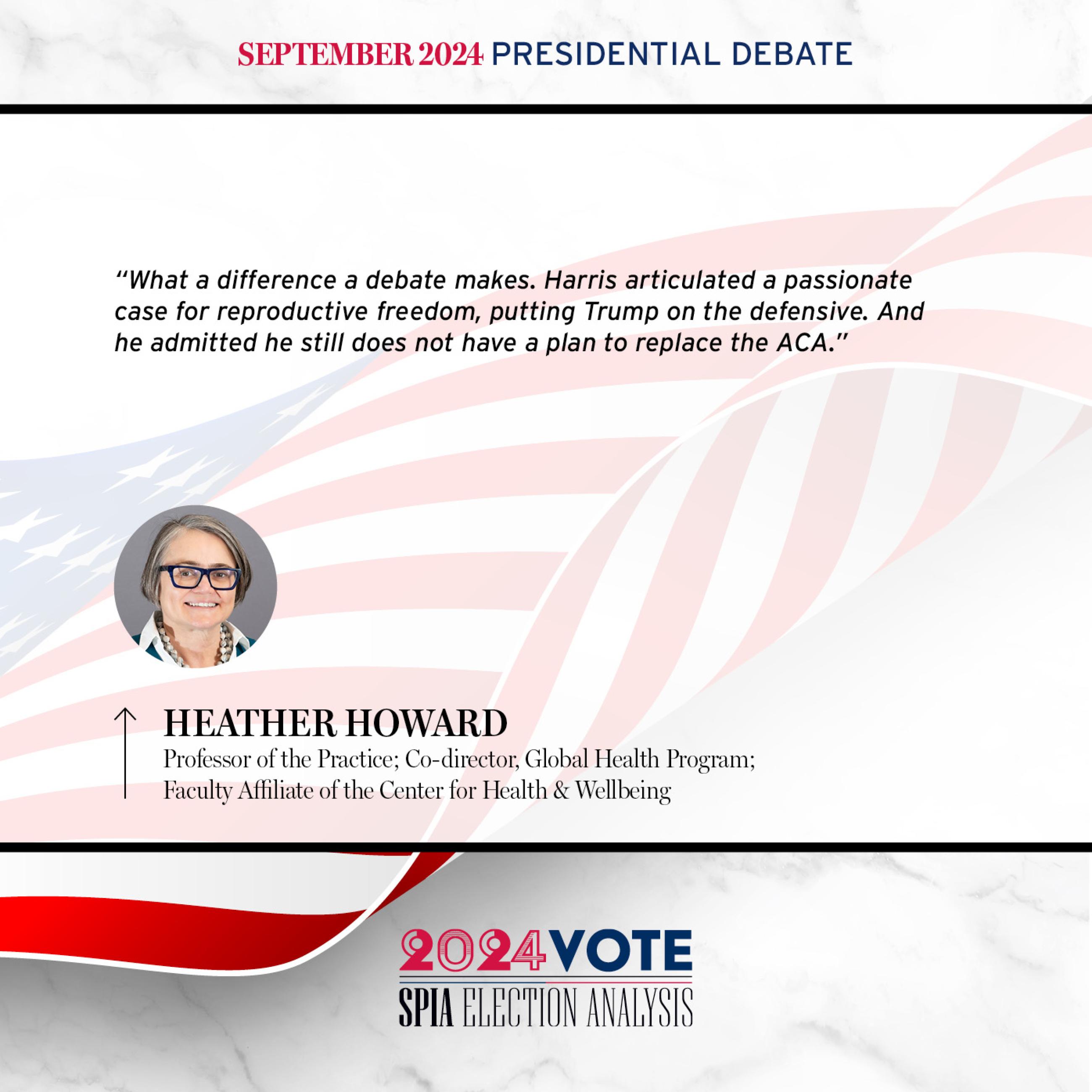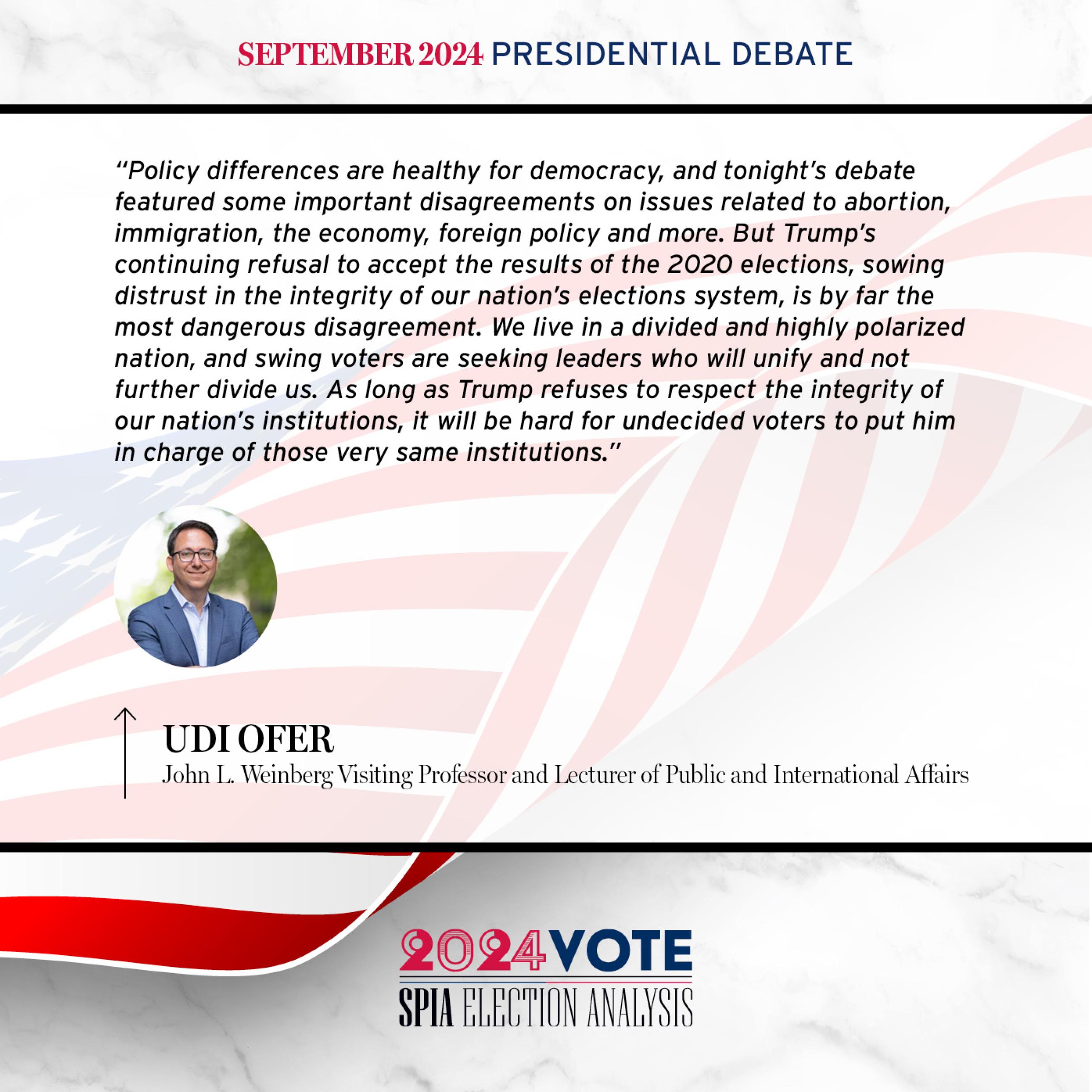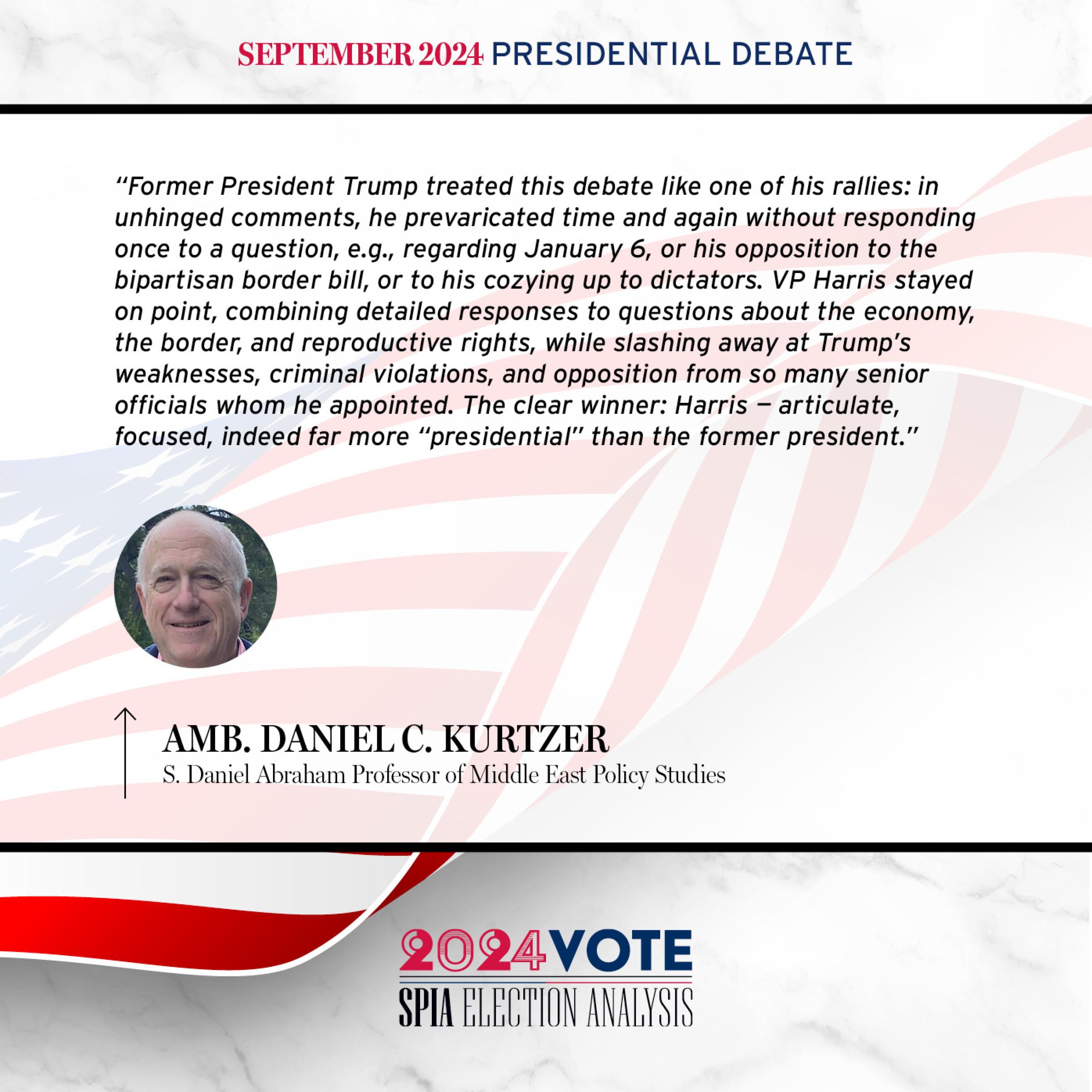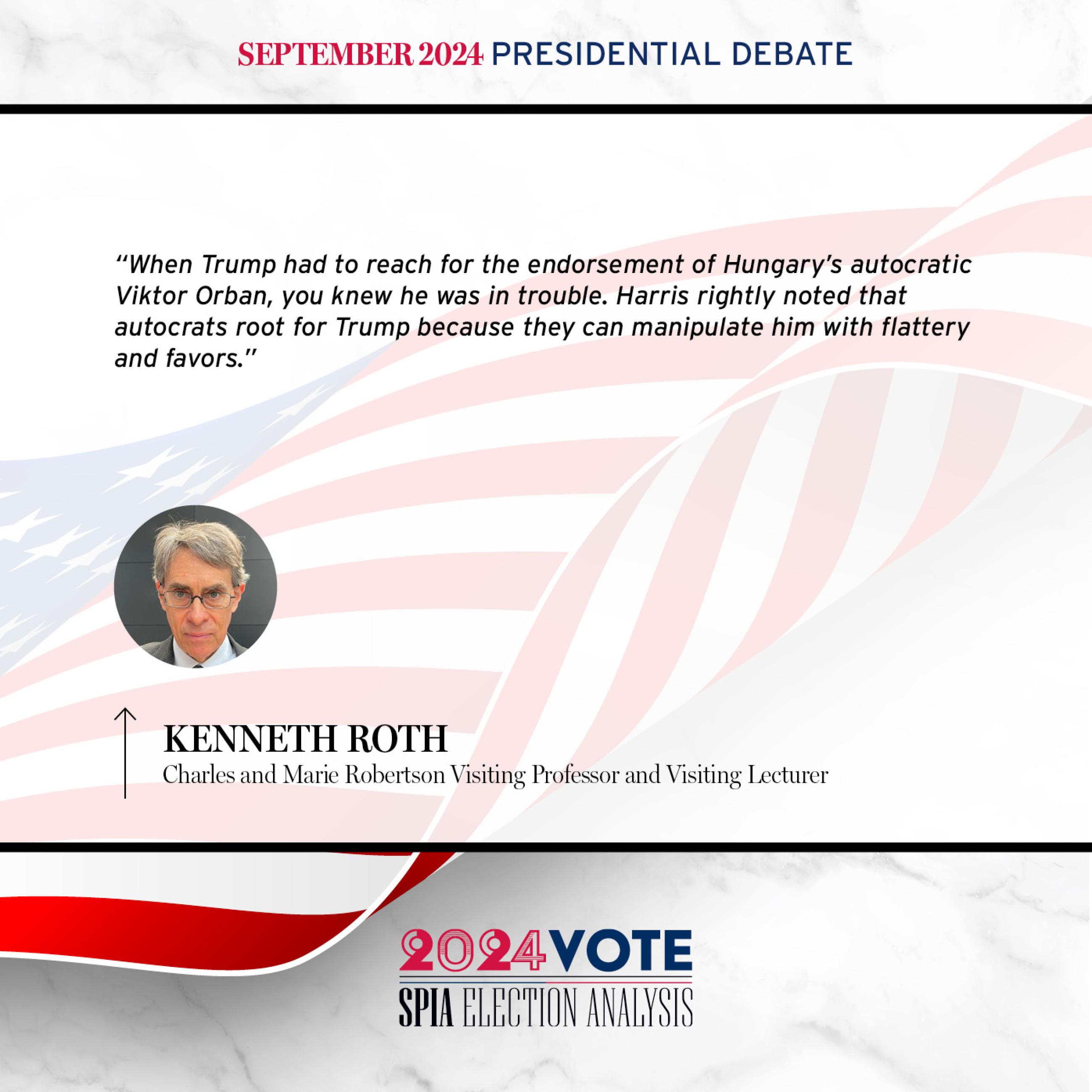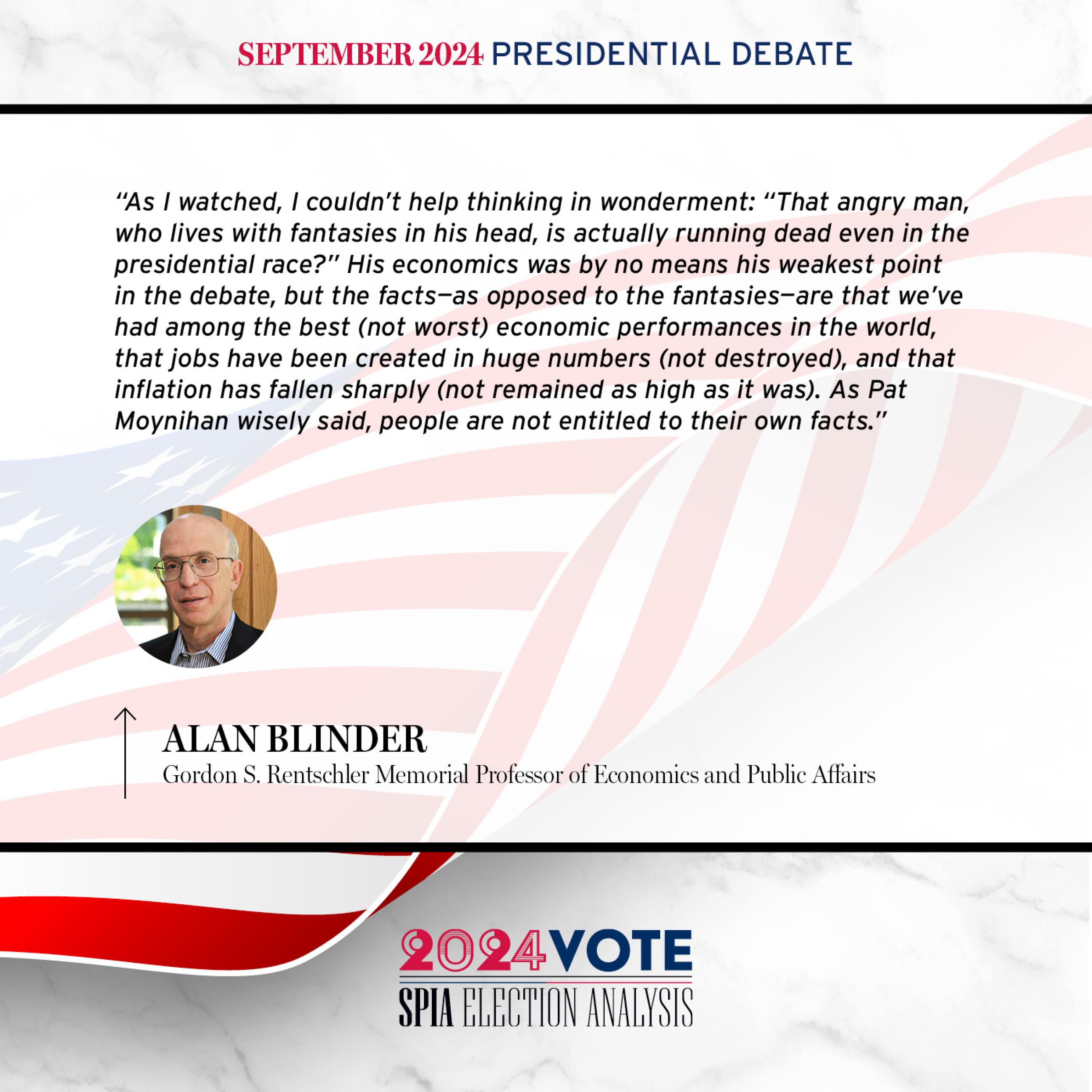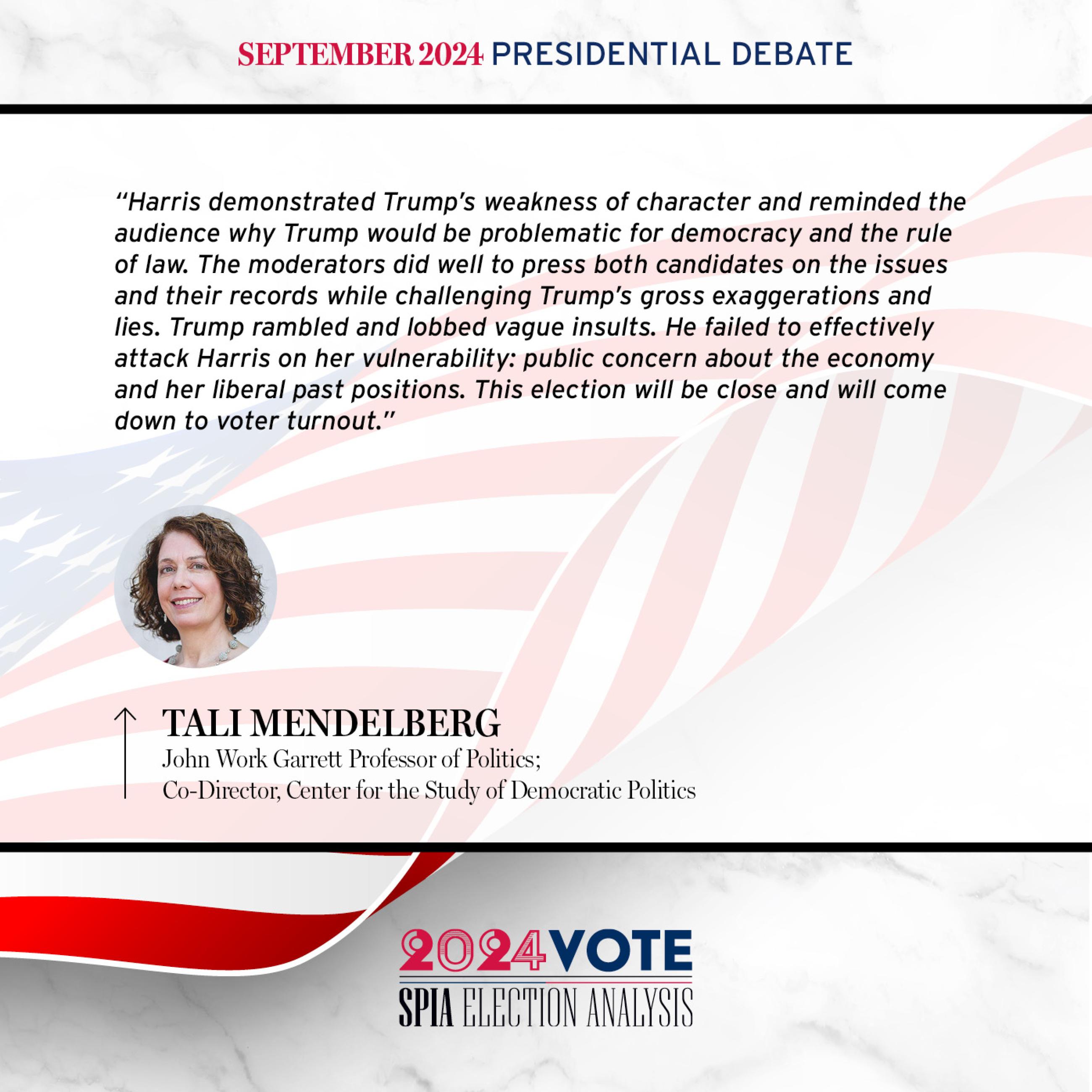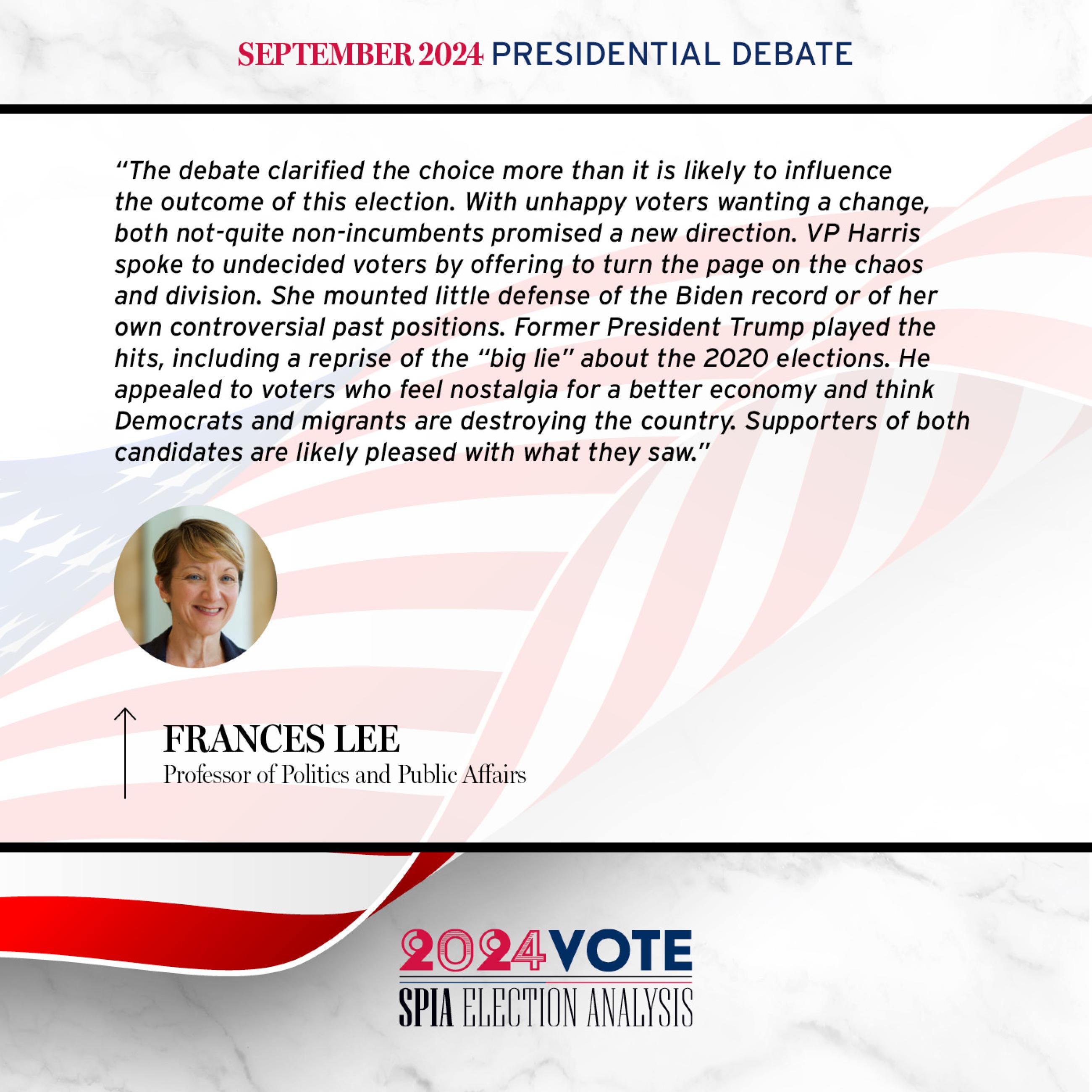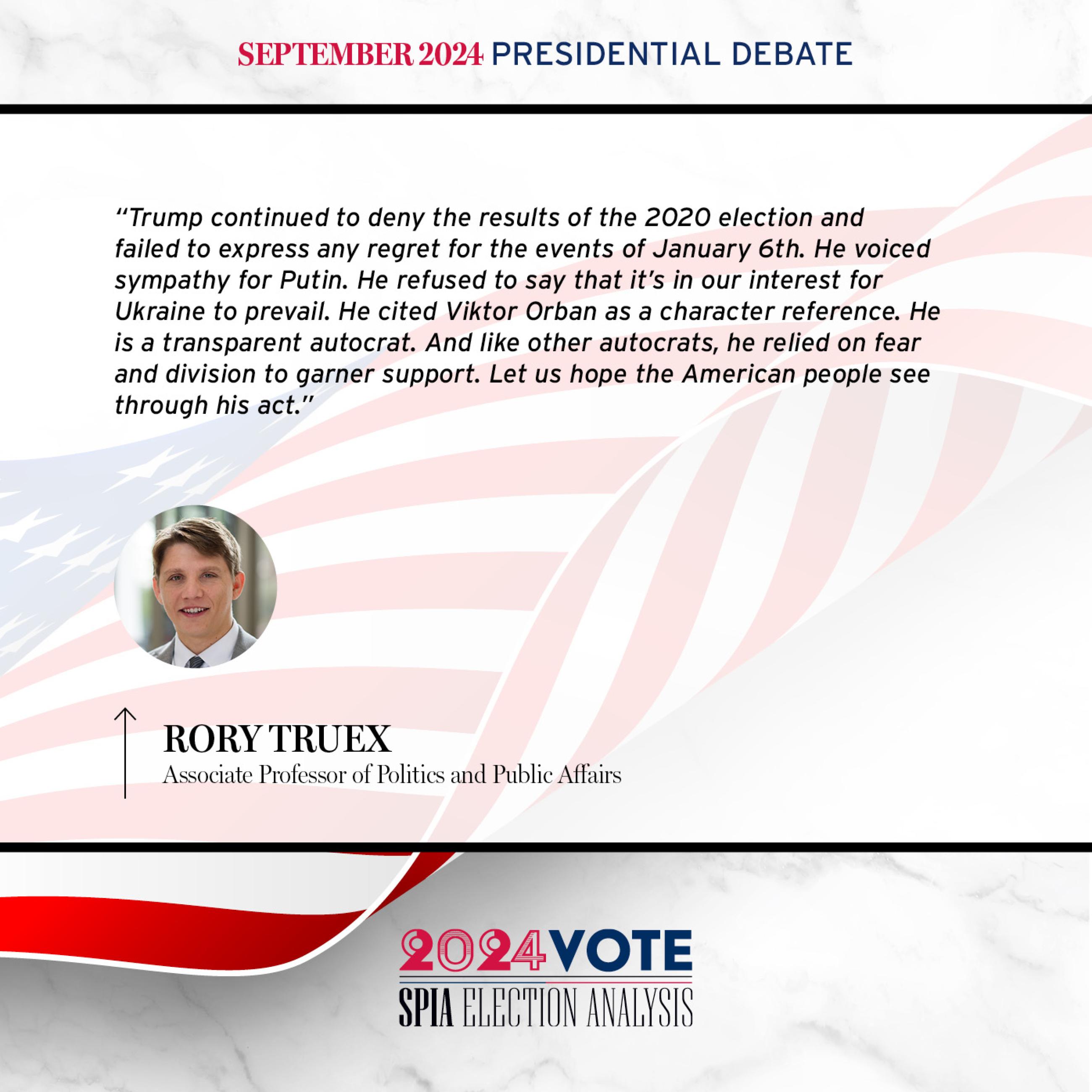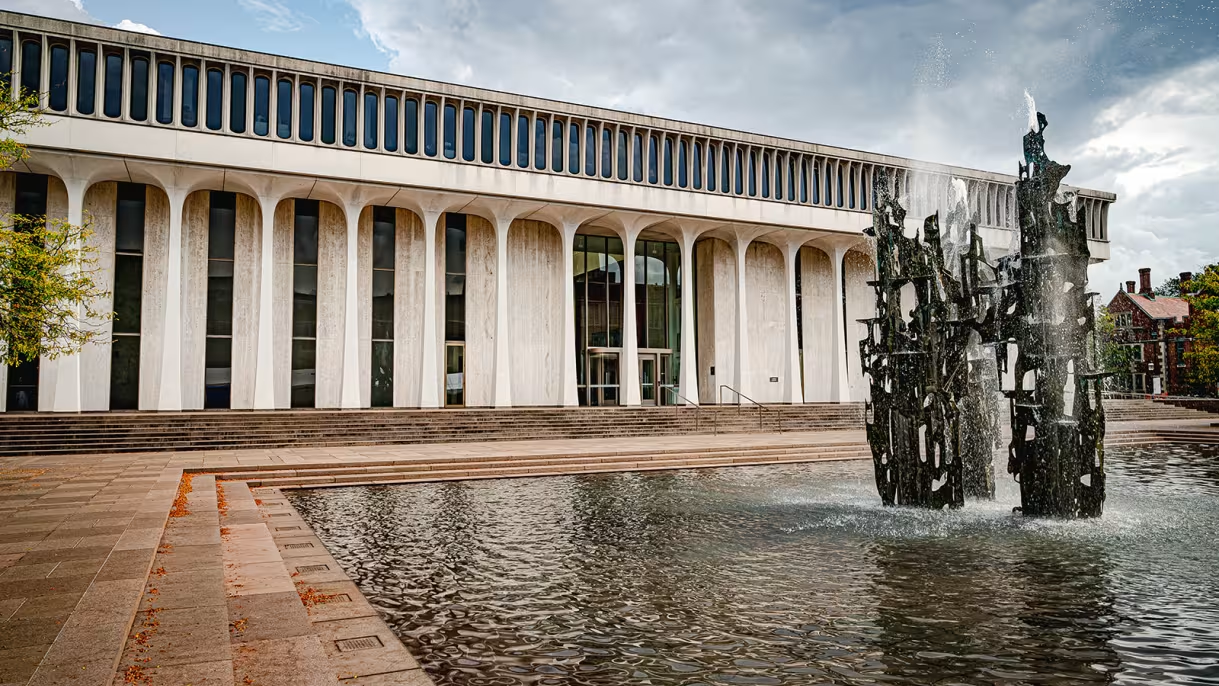Decoding the Debate: Faculty Experts Share Their Insights
Princeton SPIA scholars from diverse disciplines offer expert analysis on key moments, policy proposals, and rhetorical strategies from the second presidential debate. Their informed commentary provides a comprehensive understanding of the debate's impact, fostering a deeper appreciation of the political discourse.
Events
Bill Kristol: Our Parties, Our Politics: The 2024 Election and Beyond
Constitution Day: Preview of the 2024-2025 Supreme Court Term
Constitution Day: Hope as a Policy Priority - Exploring What's at Stake Ahead of Nov. 5th
"Ensuring a Free & Fair Election: Challenges in Law, Policy & Security” Panel, Polling Photography Exhibit, & Reception
Edward Wong
Diplomatic Correspondent, The New York Times
Amy Walter
Publisher and Editor-in-Chief, Cook Political Report
Decoding the Vote: Data-Driven Insights for the 2024 Election
The 2024 Elections: What Happened and Why?
As the November 5th elections approach, Princeton SPIA delves into the core concerns of American voters. From economic anxieties to protecting civil liberties, our faculty experts decode trends shaping public opinion, the 2024 election results, and the path forward in policymaking.
Democracy
The United States grapples with internal challenges like party polarization, racial, ethnic, and regional inequalities, and distrust of institutions and election processes. How can we safeguard our democratic values and system amidst these challenges?
Frances Lee, Professor of Politics and Public Affairs
“American democracy is under tremendous strain. We failed to have a fully peaceful transition of power after the 2020 elections. Polarization and distrust still pervade the political system. Will the winner in 2024 be acknowledged as legitimate by the loser?”
Inequality
While strides have been made in embracing the ideals of equality, significant challenges persist in achieving equity across various dimensions such as race, gender, sexuality, and more within our institutions and governance systems. What targeted progress in specific areas could effectively dismantle systemic barriers hindering our pursuit of this ideal?
Laurence Ralph, Professor of Anthropology and SPIA Associated Faculty
“With the presidential election looming, the urgency to address social inequality is palpable. Yet, in a society marked by rising hate, extremism, and division, hope for addressing social inequality lies in precisely the opposite direction.”
Climate Change
Global warming and climate change drive rising temperatures, severe weather, and economic burdens. Despite being labeled an existential crisis, it's also an opportunity for transformative action. Should the government adopt policies for clean energy transition and emissions reduction, even if it entails major changes to industries and lifestyles?
Michael Oppenheimer, Director of the Center for Policy Research on Energy and Environment; Albert G. Milbank Professor of Geosciences, International Affairs, and HMEI
“One way or another, climate change will reshape industry and lifestyles — by its impact on where people can live safely, which industries thrive, and which shrivel. We can choose our future by eliminating fossil fuels and adapting to some additional warming or be steamrolled by a much hotter climate.”
Reproductive Health and Healthcare
Access to reproductive healthcare, including birth control and safe abortion, is vital for health and well-being. Since ROE V. WADE was overturned, many states have banned or restricted access to abortion. Does the end of federal protection for abortion threaten other personal freedoms?
Heather Howard, SPIA Professor of the Practice; Co-director, Global Health Program; Faculty Affiliate of the Center for Health & Wellbeing
“Abortion is on the ballot, but it's not the only right voters will be thinking about in November. Roe’s end is already jeopardizing miscarriage management and could threaten access to infertility treatments and even contraception in many states — and potentially everywhere.”
Economy
Despite widespread pessimism about the national economy, polls reveal a more positive outlook on personal finances among Americans. What factors contribute to this disparity: partisanship, misinformation, or ineffective communication strategies?
Alan Blinder '67, Gordon S. Rentschler Memorial Professor of Economics and Public Affairs
“It's all of these — and one more: Republicans sour on the economy whenever Democrats take the White House, despite performance improvements; if your news source is Fox et al., it's conveniently distorted; Democrats are generally reticent about economy bragging, and though inflation is significantly down, people remember (hazily) lower prices from three years ago.”
Immigration
The national spotlight on immigration continues to intensify amid the southern border crisis, sparking debates on accountability and effective solutions. Is immigration now politically untouchable? Or can we chart a course that tackles illegal immigration while empowering legal immigrants vital to U.S. competitiveness?
Rafaela Dancygier, IBM Chair in International Studies; Professor, Department of Politics and SPIA; Director, The Mamdouha S. Bobst Center for Peace and Justice; Director, Initiatives on Contemporary European Affairs
“The majority of Americans view legal immigration as benefitting the country, even if there is consensus that the situation at the Southern border is untenable. Americans want bipartisan deals on immigration — but too many politicians are not heeding the public's call.”
Education and Student Debt
Student debt remains a pressing financial burden for millions of Americans, hindering crucial decisions like homeownership and entrepreneurship. Despite 4 million student borrowers benefiting from debt forgiveness, further policy changes are sought to alleviate this burden and reduce education costs. Are there viable solutions for debt relief and education affordability in the U.S.?
Jennifer L. Jennings '00, Professor of Sociology and Public Affairs, Director of the Education Research Section
“Student debt is often misunderstood. The majority of borrowers carry smaller balances, but it's those with these modest debts — often because they didn't complete college — who are most likely to default. This is precisely why forgiving small amounts of debt can be life-changing.”
Crime and Violence
Amidst pandemic-era spikes in homicides, data shows violent crime and homicides in the U.S. are declining at the quickest pace in decades. Yet, concerns about public safety persist, including ongoing calls for tougher gun safety measures. Should we focus on addressing crime's root causes — poverty, education, inequality — to create safer communities?
Pat Sharkey, William S. Tod Professor of Sociology and Public Affairs
“Understanding community violence requires addressing two key questions: What local forces drive current shifts in violent activity, such as an influx of guns or policing changes? And why are certain communities consistently more vulnerable? Effective policy must tackle short-term factors in specific neighborhoods and address underlying structural issues like concentrated poverty.”
